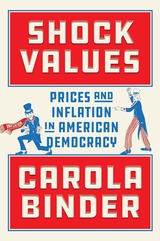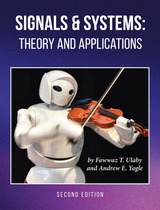6 start with H start with H
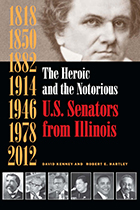
This sweeping survey constitutes the first comprehensive treatment of the men and women who have been chosen to represent Illinois in the United States Senate from 1818 to the present day. David Kenney and Robert E. Hartley underscore nearly two centuries of Illinois history with these biographical and political portraits, compiling an incomparably rich resource for students, scholars, teachers, journalists, historians, politicians, and any Illinoisan interested in the state’s senatorial heritage.
Originally published as An Uncertain Tradition: U.S. Senators From Illinois 1818–2003, this second edition brings readers up to date with new material on Paul Simon, Richard Durbin, and Peter Fitzgerald, as well as completely new sections on Roland Burris, Barack Obama, and Illinois’s newest senator, Mark Kirk. This fresh and careful study of the shifting set of political issues Illinois’s senators encountered over time is illuminated by the lives of participants in the politics of choice and service in the Senate. Kenney and Hartley offer incisive commentary on the quality of Senate service in each case, as well as timeline graphs relating to the succession of individuals in each of the two sequences of service, the geographical distribution of senators within the state, and the variations in party voting for Senate candidates. Rigorously documented and supremely readable, this convenient reference volume is enhanced by portraits of many of the senators.
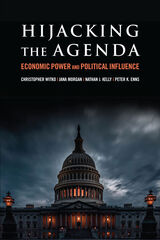
The authors analyze over 20 years of floor speeches by several hundred members of Congress to examine the influence of campaign contributions on how the national economic agenda is set in Congress. They find that legislators who received more money from business and professional associations were more likely to discuss the deficit and other upper-class priorities, while those who received more money from unions were more likely to discuss issues important to lower- and middle-class constituents, such as economic inequality and wages. This attention imbalance matters because issues discussed in Congress receive more direct legislative action, such as bill introductions and committee hearings. While unions use campaign contributions to push back against wealthy interests, spending by the wealthy dwarfs that of unions.
The authors use case studies analyzing financial regulation and the minimum wage to demonstrate how the financial influence of the wealthy enables them to advance their economic agenda. In each case, the authors examine the balance of structural power, or the power that comes from a person or company’s position in the economy, and kinetic power, the power that comes from the ability to mobilize organizational and financial resources in the policy process. The authors show how big business uses its structural power and resources to effect policy change in Congress, as when the financial industry sought deregulation in the late 1990s, resulting in the passage of a bill eviscerating New Deal financial regulations. Likewise, when business interests want to preserve the policy status quo, it uses its power to keep issues off of the agenda, as when inflation eats into the minimum wage and its declining purchasing power leaves low-wage workers in poverty. Although groups representing lower- and middle-class interests, particularly unions, can use their resources to shape policy responses if conditions are right, they lack structural power and suffer significant resource disadvantages. As a result, wealthy interests have the upper hand in shaping the policy process, simply due to their pivotal position in the economy and the resulting perception that policies beneficial to business are beneficial for everyone.
Hijacking the Agenda is an illuminating account of the way economic power operates through the congressional agenda and policy process to privilege the interests of the wealthy and marks a major step forward in our understanding of the politics of inequality.
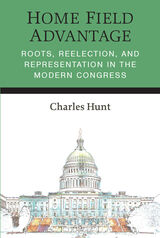
Although partisan polarization gets much of the attention in political science scholarship about Congress, members of Congress represent diverse communities around the country. Home Field Advantage demonstrates the importance of this understudied element of American congressional elections and representation in the modern era: the local, place-based roots that members of Congress have in their home districts. Charles Hunt argues that legislators’ local roots in their district have a significant and independent impact on their campaigns, election outcomes, and more broadly on the relationship between members of the U.S. House of Representatives and their constituents. Drawing on original data, his research reveals that there is considerable variation in election outcomes, performance relative to presidential candidates, campaign spending, and constituent communication styles that are not fully explained by partisanship, incumbency, or other well-established theories of American political representation. Rather, many of these differences are the result of the depth of a legislator’s local roots in their district that predate their time in Congress. Hunt lays out a detailed “Theory of Local Roots” and their influence in congressional representation, demonstrating this influence empirically using multiple original measures of local roots over a full cross-section of legislators and a significant period of time.
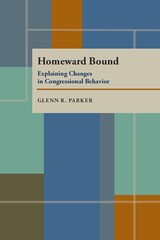
Richard Fenno first coined the term home style to describe the ways in which members of Congress cultivate the voters of their home constituencies. He suggested that incumbents were paying more attention to their constituents than they had in the past. In this book, Glenn Parker examines the relationship between activities at home and in Washington, asking specifically: Why and when did congressmen and senators begin to pay more attention to their constituents? And what are the institutional consequences of this change?
Using data drawn from the travel vouchers filed by incumbent senators and congressmen between 1959 and 1980, Parker shows that since the mid-1960s incumbents have been placing greater emphasis on service to their state or district. Congress has facilitated this change in various ways, such as by increasing travel allowances and by scheduling that minimizes the conflict between legislative business in Washington and time spent with constituents.
Parker's study includes both the Senate and House, and he draws distinctions between the home-style behaviors of senators and representatives. He also provides a historical context for understanding the dynamics of changes in home style. The time-series data generate explanations that specify relationships among historical conditions, individual behavior, and institutional structures.
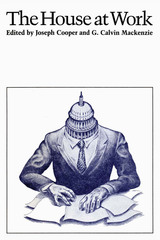
There exists a rich literature on the workings of the United States Congress, but The House at Work is the first book to focus on the institutional performance of the House of Representatives. A complete overview of the complex functioning and dynamics of Congress is presented by distinguished contributors, drawing upon both real-life experience and organization theory.
Each essay presents material on activities central to legislative work in the House, including the internal operations of member and committee offices, the administrative support system of the House, the impact of organizational structure and information resources on individual decision making, the expanding application of computer technology, the character of the personnel system, and the processing of constituent casework.
Nearly all contributors were professional staff members of the U.S. House Commission on Administrative Review in 1976 and 1977, whose analysis of the internal operations of the House was acomprehensive investigation. Their academic training, buttressed by significant practical experience on Capitol Hill, makes this book of great value to both students and scholars of the legislative process. In addition to the editors, the contributors include Glenn R. Parker, Thomas E. Cavanagh, Allan J. Katz, John R. Johannes, Thomas J. O'Donnell, David W. Brady, Louis Sandy Maisel, Susan Webb Hammond, Jarold A. Kieffer, James A. Thurber, and Jeffrey A. Goldberg.
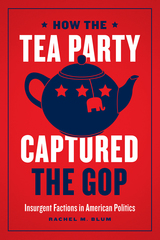
In How the Tea Party Captured the GOP, Rachel Marie Blum approaches the Tea Party from the angle of party politics, explaining the Tea Party’s insurgent strategies as those of a party faction. Blum offers a novel theory of factions as miniature parties within parties, discussing how fringe groups can use factions to increase their political influence in the US two-party system. In this richly researched book, the author uncovers how the electoral losses of 2008 sparked disgruntled Republicans to form the Tea Party faction, and the strategies the Tea Party used to wage a systematic takeover of the Republican Party. This book not only illuminates how the Tea Party achieved its influence, but also provides a framework for identifying other factional insurgencies.
READERS
Browse our collection.
PUBLISHERS
See BiblioVault's publisher services.
STUDENT SERVICES
Files for college accessibility offices.
UChicago Accessibility Resources
home | accessibility | search | about | contact us
BiblioVault ® 2001 - 2024
The University of Chicago Press


